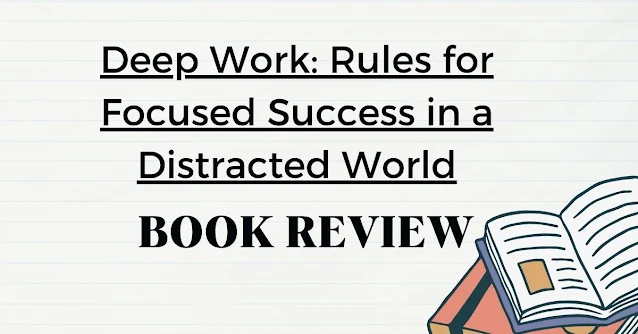 |
| Image designed by BookVouch using Canva |
Introduction: The Value of Focus in the Digital Age
In today’s fast-paced world filled with notifications, emails, and endless digital distractions, the ability to concentrate has become a rare and valuable skill. Most people feel overwhelmed, busy, and scattered, yet they struggle to produce truly meaningful work. This is where Cal Newport’s groundbreaking book, Deep Work: Rules for Focused Success in a Distracted World, comes in.
Newport, a computer science professor and productivity expert, introduces a powerful idea: deep work. It’s a concept that has transformed how people approach tasks, achieve goals, and find satisfaction in their work. In this review, we will explore the core ideas of the book, why deep work is essential, practical rules to implement it, and how you can get started today.
What Is Deep Work?
Cal Newport defines deep work as the ability to focus without distraction on cognitively demanding tasks. These tasks push your mental capabilities to their limits, and performing them well creates new value, improves your skill, and is hard to replicate.
In contrast, shallow work is non-demanding, often performed while distracted, and doesn’t create much value. Think checking email, responding to quick messages, or browsing social media. Newport argues that while shallow work is necessary, it should never dominate your day. Deep work, on the other hand, is where true progress happens.
The Deep Work Hypothesis
Newport’s central claim is clear: The ability to perform deep work is becoming increasingly rare at exactly the same time it is becoming increasingly valuable in our economy. As a result, those who cultivate this skill, and then make it the core of their working life, will thrive.
In an age where multitasking is glorified, and distractions are constant, the ability to focus deeply is a competitive advantage. It can elevate your performance, help you stand out, and ultimately bring more fulfillment to your professional and personal life.
Why Deep Work Is So Powerful
- You Learn Faster: Deep work allows you to absorb and retain complex information more efficiently.
- You Produce Better Results: Distraction-free work leads to higher quality output.
- You Gain Satisfaction: Completing meaningful work creates a sense of accomplishment.
- You Strengthen Discipline: Practicing focus builds mental strength and control.
The Four Rules of Deep Work
Rule #1: Work Deeply
Create rituals and routines that support deep work. Set aside specific hours, minimize interruptions, and design an environment that supports concentration.
Rule #2: Embrace Boredom
Practice resisting distractions. Let your mind rest. Boredom is a training ground for mental endurance.
Rule #3: Quit Social Media
Be selective and intentional with your digital tools. Evaluate which platforms truly add value.
Rule #4: Drain the Shallows
Minimize low-value tasks like unnecessary meetings or constant emails. Guard your time for high-value deep work.
Real-Life Applications of Deep Work
Newport shares examples from professionals who use deep work for excellence. Writers like J.K. Rowling, scientists like Carl Jung, and executives like Bill Gates have relied on focused isolation to produce outstanding work.
Common Challenges & How to Overcome Them
- Too Many Distractions: Use apps like Freedom or Cold Turkey.
- Lack of Routine: Try a daily deep work schedule. Even 60-90 minutes helps.
- Work Culture Expectations: Communicate your schedule. Use calendar blocks for focus time.
The Deep Life Philosophy
Deep work is a mindset and a lifestyle. Newport introduces "The Deep Life," where you prioritize meaningful work and deliberate practice over digital noise and busyness. This lifestyle leads to more success, peace, and purpose.
Who Should Read Deep Work?
- Professionals seeking career growth
- Students who want to focus better
- Entrepreneurs building something meaningful
- Creatives needing high-quality output
- Anyone feeling overwhelmed by distractions
Criticism and Considerations
Some argue that Newport’s approach doesn’t fit all jobs. But even in high-communication roles, setting focused blocks of time can still make a difference. The key is to adapt the principles to your life.
Conclusion: Your Focus Is Your Future
Deep Work is a wake-up call. In a busy, noisy world, Newport invites us to slow down, focus, and create with purpose. You don’t just get more done—you get better work, a clearer mind, and a more meaningful life.
Comments
Post a Comment